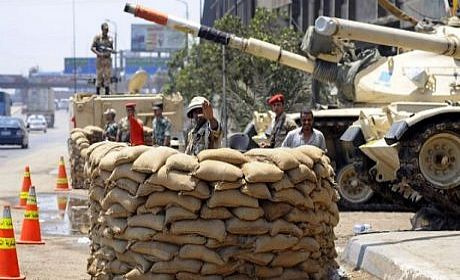Egyptian Army Does Not Support Democracy

In macro-developments, the players’ performances are more closely focused on than their objectives, and therefore, they are evaluated on that basis. When the Egyptian army took the final step in overthrowing the Morsi government, many in the region and beyond compared the army’s actions with the actions of the Turkish army in the past decade and considered it as a supporter of the newly-found democracy in Egypt. But the question that is raised is that if the Turkish army supported Ataturk’s secularism, what ideology has the Egyptian army stood in defense of? A look at the macro-performance of the army, which is naturally caused by its objectives, can present a more realistic assessment of what has happened.
When Mubarak was overthrown, the army entered the scene to control the declining situation. During the Mubarak era, three major players directed the political developments: the National Democratic Party and the government, the army, and to a much lesser extent, the opposition. When the shaky position of the first player led to domestic insecurity and instability in Egypt, the army entered the scene against the declining player in order to maintain security and stability. The army had nothing to do with democracy.
After Mubarak, the players on the scene changed their face and their structure; the army, the Muslim Brotherhood, and the opposition. The opposition had been weakened due to the separation of the Muslim Brotherhood. The Egyptian army, in the games it played during the SCAF military council’s rule, reached the conclusion that the costs of being present in power were more than the costs of leaving it; hence, despite the strong willingness he showed in the beginning, Tantawi did not become a candidate for the presidency. Following the coming to power of the Muslim Brotherhood and, particularly, after the dismissal of the army leaders in August 2012, the concerns of the army about the measures taken by the Muslim Brotherhood government grew. But, following the experience of the transition period, the military commanders were not willing and did not have the ability to confront the president-elect.
The orders issued by Morsi’s government in November 2012, which unprecedentedly united the political scene against the Muslim Brotherhood, led to the gradual return of the army to the scene. During this period, there were serious rumors about the major differences between the president and the Minister of Defense in Cairo. Meanwhile, a big development occurred in the opposition which impacted the political calculations of the army. The National Salvation Front was able to gradually direct the Salafis towards neutrality and then towards opposing the Muslim Brotherhood. If we add the support of those remaining from the Mubarak regime to the weight of the opposition, the gradual change in Egypt’s political balance can be better understood. This strange equation, which in practice meant the isolation of the Muslim Brotherhood in power despite holding the presidency and the parliament, could not have had any other outcome except the army’s inclination towards the opposition.
Just as the army had entered the scene to maintain stability and security during Mubarak’s downfall, the same was true for Morsi. Basically, the democratic or authoritarian nature of the ruling government is a secondary issue for the army. The army’s priority is to maintain political stability and domestic and border security. These two are important for the army because, since the 1980s and as a result of the policies of Mubarak and Abu Ghazala, the Defense Minister at the time, to bring the army into economic developments, this army was transformed into the country’s biggest economic player. Today, besides controlling the military industry, the army has many non-military industries under its control as well and produces practically everything for the people of Egypt.
This issue, besides having huge benefits for Egypt’s economy, is vital for the Egyptian army when there is no war. Many Egyptian military officers have become professional businessmen due to their involvement in the economic cycle of the army. Furthermore, this cycle has removed a huge part of the unemployment problem in Egypt. Political stability and domestic and border security guarantees the economic cycle of the army. That is why the main objective of the army behind any political measure is to maintain domestic stability and security. Thus, if one day Egypt’s newly-found democracy leads to uncontrollable tumult, the army of this country would possibly support a new dictator in search of security. The goal of the army behind its cooperation with the opposition and the downfall of Morsi was not to maintain democracy, but rather to bring back political stability and prevent security disorder.

